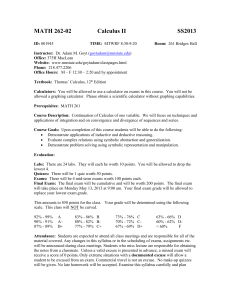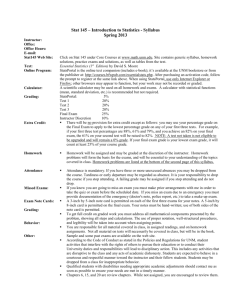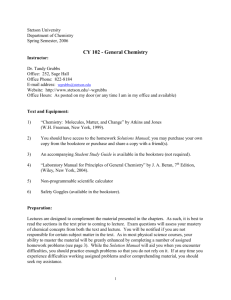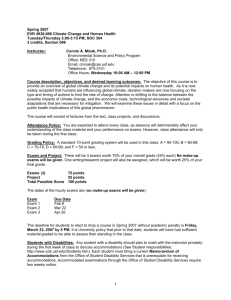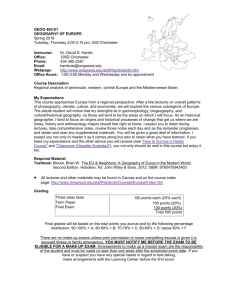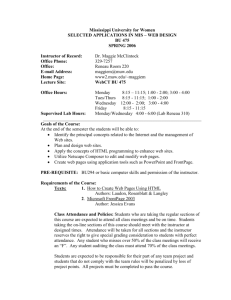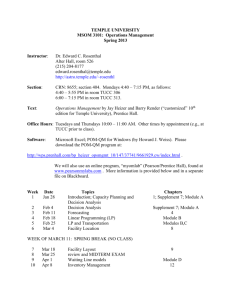CHEM 332 Course Syllabus - Towson University
advertisement
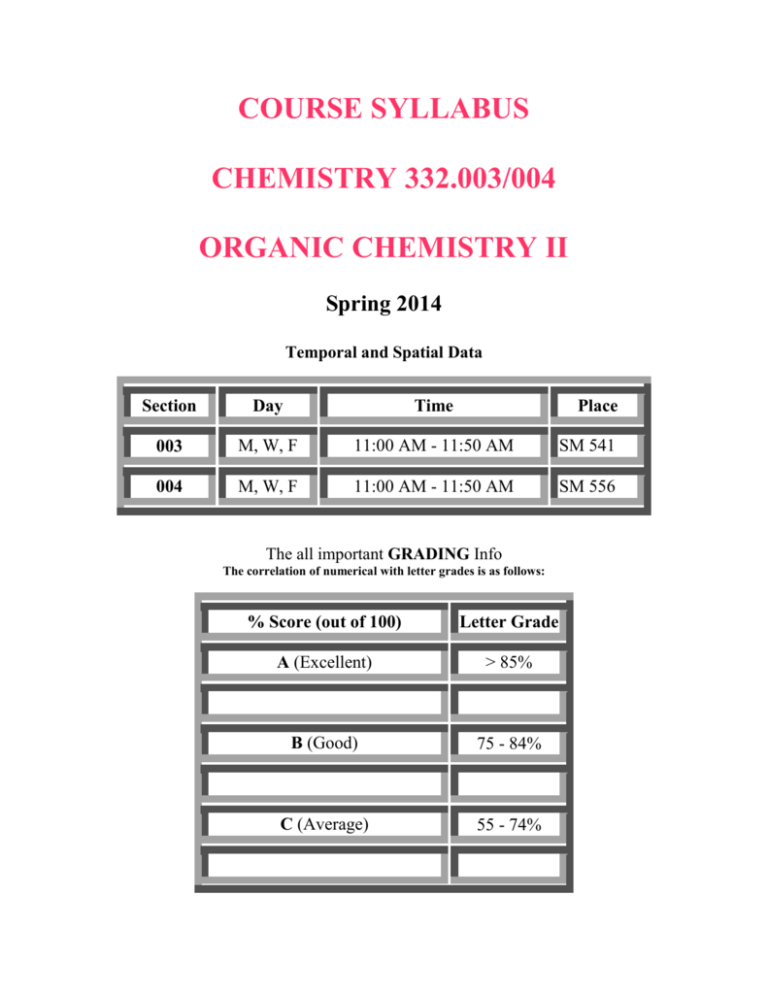
COURSE SYLLABUS CHEMISTRY 332.003/004 ORGANIC CHEMISTRY II Spring 2014 Temporal and Spatial Data Section Day Time Place 003 M, W, F 11:00 AM - 11:50 AM SM 541 004 M, W, F 11:00 AM - 11:50 AM SM 556 The all important GRADING Info The correlation of numerical with letter grades is as follows: % Score (out of 100) Letter Grade A (Excellent) > 85% B (Good) 75 - 84% C (Average) 55 - 74% D (Less than satisfactory, credit) >50 - 54% F (Unsatisfactory, no credit) < 49% The final grade is based on a weighted average of 25% final exam, 40% semester exams and 35% laboratory. NOTE : you must attain a grade of C or better in both the laboratory and the lecture portion of the course in order to attain a passing grade. Required and Recommended Materials Texts/Range Organic Chemistry, John McMurry, 8th Ed., 2010, Brooks/Cole; Chapters 13, 15-23, 24 Recommended Materials Study Guide and Solutions Manual, John McMurry, 8th Ed., 2010, Brooks/Cole Molecular Model Kit (Various types are available in the University Bookstore) Scope: This course is the second of a two-semester sequence designed to introduce students to modern synthetic Organic Chemistry. It will focus on the application of principles covered in CHEM 331 towards understanding of the methods and mechanisms of organic and organometallic synthetic transformations. DATE AND SCHEDULE OF LECTURE TOPICS (CHAPTERS) approximate Jan 29, 31, Feb 3-7 Alcohosl, Ethers, Epoxides (17 and parts of 18). Feb 10 - 20 Amines (24). Aldehydes and Ketones (19). NOTE: Last day to drop a course with NO GRADE posted is Feb 4th Feb 21st TEST I Feb 24 – Mar 3 Aldehydes and Ketones (19). Carboxylic Acids Overview (20). Mar 5 - 12 Carboxylic Acid Derivatives (21). Mar 14th TEST II Mar 17 - 28 Enolate Anions (22). March 17th - 23rd Spring Break Apr 4th TEST III NOTE: Apr 11th is the last day to drop a course with a grade of "W" Apr 7 - 18 Carbonyl Condensation (23). Apr 21 - 28 Aromatic Compounds (15). Apr 28th TEST IV Apr 30 – May 12 EAS (16, possibly parts of 24). FINAL - May 19th 08:15 AM - 10:15 AM ADDITIONAL NOTES Grading policy as well as the overall structure of the course will be reviewed during the first class. While the attendance of lectures is not formally required, it is very likely that a student will get a grade no better then D if he or she misses more than 4 lectures. About 1520% of the lecture material is not covered in the book. Attendance is mandatory for all laboratory periods. No student may start the laboratory exercise if he/she is more than 15 minutes late for the lecture portion of the lab. If you are forced to miss lab due to illness or other valid reason, you must inform me ahead of time and produce a note from a doctor etc. attesting to the validity of the excuse. Recommended homework problems will not be graded or collected. Instructor will be available to answer questions regarding suggested problems. A student must be prepared to show a full account of their attempts at solving a problem he or she does not fully understand. Reading of the assigned chapter ahead of class is very important. No make-up exams will be given under any circumstances. By special arrangement a student may take an exam early. If an exam is missed and a valid, documented reason (such as illness etc.) exists, the average grade of other exams will be assigned. CHEATING - Any work copied from a book or journal without reference will be considered plagiarized and no credit will be given for the work it is part of. Extensive paraphrasing will receive the same treatment. Please remember this when you are writing lab reports. Although consultation between students in solving problems and preparing lab reports is encouraged, identical problem sets and/or copied lab reports (whole or in part) will be considered plagiarized and will be given no credit. I will not try to discover who copied from whom; both reports will be rejected! Keep this in mind since your reports are computer generated. This may provide an inducement to wholesale copy files, tables, diagrams, etc. Any cheating on exams (copying from other students work or from materials brought in, substitute examinees, changing answers after the tests have been returned, stealing tests etc.) or laboratory (results invented, fudged, doctored, copied etc.) will result in a grade of F for the course. Without honesty, there is no science - there can be no compromises at any stage.

